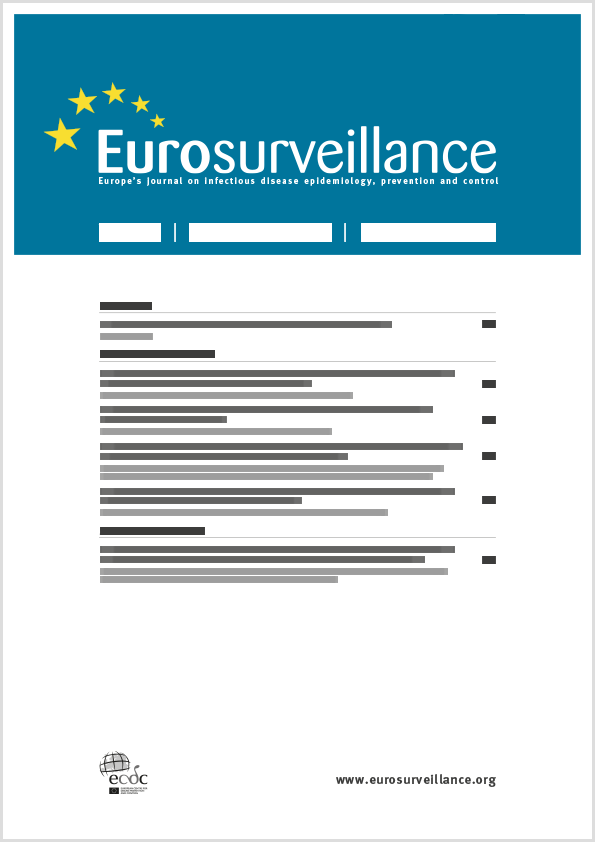- Home
- Eurosurveillance
- Previous Issues
- Volume 16, Issue 17, 28/Apr/2011
Eurosurveillance - Volume 16, Issue 17, 28 April 2011
Volume 16, Issue 17, 2011
- Editorials
- Rapid communications
-
-
-
Appearance of a novel measles G3 strain in multiple European countries within a two month period, 2010
K E Brown , M N Mulders , F Freymuth , S Santibanez , M M Mosquera , S Cordey , J Beirnes , S Shulga , R Myers and D FeatherstoneMore LessDuring late 2010, a previously unrecognised strain of measles genotype G3 virus was identified in five different European countries by the World Health Organization Measles and Rubella Laboratory Network. Apart from one, none had a travel history to south-east Asia, the usual source of G3 viruses, although epidemiological links could be established between some of the cases. This case series illustrates the value of genotyping and sequencing in tracking measles infections, and identifying otherwise unrecognised chains of transmission.
-
- Top
-
- Research articles
-
-
-
The impact of the 2009 influenza A(H1N1) pandemic on attitudes of healthcare workers toward seasonal influenza vaccination 2010/11
C Brandt , H F Rabenau , S Bornmann , R Gottschalk and S WickerMore LessThe emergence of the influenza A(H1N1)2009 virus provided a major challenge to health services around the world. However, vaccination rates for the public and for healthcare workers (HCWs) have remained low. We performed a study to review the reasons put forward by HCWs to refuse immunisation with the pandemic vaccine in 2009/10 and characterise attitudes in the influenza season 2010/11 due to the emergence of influenza A(H1N1)2009. A survey among HCWs and medical students in the clinical phase of their studies was conducted, using an anonymous questionnaire, at a German university hospital during an influenza vaccination campaign. 1,366 of 3,900 HCWs (35.0%) were vaccinated in the 2010/11 influenza season. Of the vaccinated HCWs, 1,323 (96.9%) completed the questionnaire in addition to 322 vaccinated medical students. Of the 1,645 vaccinees who completed the questionnaire, 712 had not been vaccinated against the influenza A(H1N1)2009 virus in the 2009/10 season. The main reason put forward was the objection to the AS03 adjuvants (239/712, 33.6%). Of the HCWs and students surveyed, 270 of 1,645 (16.4%) stated that the pandemic had influenced their attitude towards vaccination in general. Many German HCWs remained unconvinced of the safety of the pandemic (adjuvanted) influenza vaccine. For this reason, effective risk communication should focus on educating the public and HCWs about influenza vaccine safety and the benefits of vaccination.
-
- Top
-
- Perspectives
-
-
-
Innovations in communication: the Internet and the psychology of vaccination decisions
More LessThis paper provides a psychological perspective on the possible effect of the Internet on the decision against vaccination. The reported importance of the Internet in health decisions is still low, but rising; especially the amount of interactive use of the Internet is increasing, e.g. due to the use of social media. It is argued that the fact that individuals do not report the Internet to be an important source of information does not necessarily mean that the information obtained in their Internet searches is not influential in their decisions. Evidence is summarised here regarding the (anti-)vaccination information on the Internet, and its influence on risk perceptions and on vaccination intentions and behaviour in relation to the encoded information. The conclusion suggests that scholars should strive to explain the underlying processes and potential mediators of vaccination decisions to increase the effectiveness of health communication. In reference to a definition of evidence-based medicine, a great future challenge lies in evidence-based public health communication based on interdisciplinary research involving public health, medical research, communication science and psychology.
-
- Top
-
- News
- Miscellaneous
-
Volumes & issues
-
Volume 30 (2025)
-
Volume 29 (2024)
-
Volume 28 (2023)
-
Volume 27 (2022)
-
Volume 26 (2021)
-
Volume 25 (2020)
-
Volume 24 (2019)
-
Volume 23 (2018)
-
Volume 22 (2017)
-
Volume 21 (2016)
-
Volume 20 (2015)
-
Volume 19 (2014)
-
Volume 18 (2013)
-
Volume 17 (2012)
-
Volume 16 (2011)
-
Volume 15 (2010)
-
Volume 14 (2009)
-
Volume 13 (2008)
-
Volume 12 (2007)
-
Volume 11 (2006)
-
Volume 10 (2005)
-
Volume 9 (2004)
-
Volume 8 (2003)
-
Volume 7 (2002)
-
Volume 6 (2001)
-
Volume 5 (2000)
-
Volume 4 (1999)
-
Volume 3 (1998)
-
Volume 2 (1997)
-
Volume 1 (1996)
-
Volume 0 (1995)
Most Read This Month

-
-
Detection of 2019 novel coronavirus (2019-nCoV) by real-time RT-PCR
Victor M Corman , Olfert Landt , Marco Kaiser , Richard Molenkamp , Adam Meijer , Daniel KW Chu , Tobias Bleicker , Sebastian Brünink , Julia Schneider , Marie Luisa Schmidt , Daphne GJC Mulders , Bart L Haagmans , Bas van der Veer , Sharon van den Brink , Lisa Wijsman , Gabriel Goderski , Jean-Louis Romette , Joanna Ellis , Maria Zambon , Malik Peiris , Herman Goossens , Chantal Reusken , Marion PG Koopmans and Christian Drosten
-
- More Less


